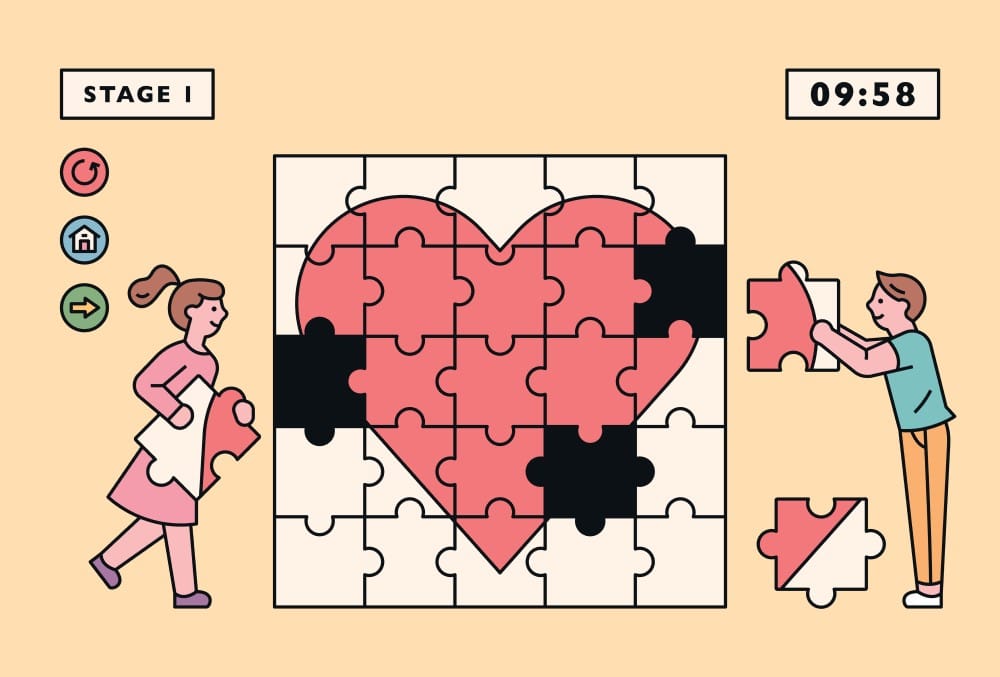What are the Expectations in Dating for Women?

Key Takeaway:
- Women tend to have higher expectations in dating, which can be influenced by factors such as education, intelligence, political views, educational background, employment status, and smoking habits.
- Trust and unconditional love play a crucial role in building and maintaining healthy relationships, emphasizing the significance of understanding and supporting each other beyond achievements and success.
- In relationships, embracing differences and respecting diverse opinions helps nurture personal growth and establishes a strong bond based on mutual understanding.
The Expectations Gap: Why Women Tend to Be More Selective in Dating
When it comes to dating, there’s an intriguing dynamic at play: women tend to be more selective than men. In this section, we’ll dive into what are the expectations in dating for women, the expectations gap and explore why this phenomenon exists. We’ll discuss the role of selectivity in dating, factors that influence women’s selectivity, and the specific challenges faced by college-educated single women. Get ready to uncover the fascinating reasons behind women’s heightened discernment in the dating world.
The Role of Selectivity in Dating
Selectivity is a major factor in dating for women. Education, intelligence, political views, and smoking habits all make an impact in the selection process. College-educated single women can find it hard to find compatible partners due to their high expectations. This expectation’s effect on dating cannot be underestimated.
For women, selectivity plays a big part in choosing a partner. Education and intelligence help decide how picky they are. Women often prefer partners with brains and similar educational backgrounds. They may also look for someone with the same political beliefs and values.
Educational background and employment status can affect a woman’s selectivity when it comes to dating. Women who have achieved higher education levels tend to be more selective. Smoking habits can be a deal-breaker for many women, as they may prefer non-smokers for health reasons.
College-educated single women have a unique challenge in finding compatible partners. Their high expectations may cause difficulty in meeting someone who meets their criteria. This pressure can lead to frustration and disappointment.
It is important to know the importance of expectations on dating success. Unrealistic expectations can prevent meaningful relationships and cause discontent. To build healthy and fulfilling relationships, individuals need to manage their expectations effectively.
Factors that Influence Women’s Selectivity
Education, intelligence, political views, educational background, employment status, and smoking habits; all these shape women’s selectivity while dating. Highly educated and intelligent women have higher standards for partners. They seek intellectual compatibility and partners who share their ideologies. Women with higher levels of education and prestigious job positions prioritize finding equally accomplished partners. Smoking is often viewed as a negative health effect. Non-smokers are seen as healthier and more desirable for long-term relationships. All these factors combined dictate women’s choices when it comes to dating.
Education and Intelligence
Education and intelligence are important in dating. Women often put more emphasis on a potential partner’s education and intelligence. They look for someone who shares their level of education and similar intellectual capabilities. Women value intelligence because it leads to stimulating conversations and shared interests.
This impacts the expectations gap that exists. College-educated single women often have difficulty finding compatible partners. The expectations of education and intelligence greatly influence women’s dating preferences.
The significance of education and intelligence in dating is huge. Women seek out compatible mindsets and shared values. However, other factors such as political views, smoking habits, and employment status also come into play.
Finding a compatible partner is like politics; you have to swipe left or right based on your beliefs.
Political Views
The role of political views in dating can be an important factor for women. Education, intelligence, and political views are key considerations when choosing a partner. Factors to consider include:
- Education and Intelligence: Women prefer partners with similar educational backgrounds and intelligence.
- Political Views: Women often prefer those who share their political beliefs and values.
- Educational Background and Employment Status: Education level and employment status can influence political views, so these are relevant.
- Smoking Habits: Political views can even extend to health-related behaviors like smoking. Women may be more selective with different views on this.
Compatibility can be difficult for college-educated single women. Expectations for the potential partner can greatly influence dating success. Understanding trust and unconditional love in relationships helps build stronger connections through mutual respect and support. Connecting on an emotional level is important and embracing differences in hobbies and pursuits can bring growth.
Unrealistic expectations, such as attractiveness, sex frequency, financial contributions, and dependency, should be addressed. Communication is key to understanding and managing expectations.
Additionally, men face challenges in response to women’s expectations. Strategies like communication and understanding can help navigate these issues. When discussing political views in dating, open-mindedness and respect for diverse opinions should be approached with care. Meaningful conversations about politics can create deeper understanding of beliefs and values.
Searching for a soulmate who meets my educational background and employment status might seem impossible – like searching for a unicorn in a sea of donkeys!
Educational Background and Employment Status
Women’s educational background and job status have a big effect on their pickiness when it comes to dating. Data shows these factors influence women’s expectations and choices when choosing a partner.
To understand the importance of educational background and employment status, numerous points need to be considered. The table below demonstrates some aspects affected by women’s educational background and job status:
| Factors | Influence on Selectivity |
|---|---|
| Level of Education | Higher education can lead to higher expectations |
| Type of Employment | Stable job prospects may contribute to pickiness |
| Career Achievements | Professional accomplishments may affect expectations |
Aside from education and employment, other unique details also shape women’s selectivity in dating. These incorporate components like political views and smoking habits, as indicated by the reference data.
Sarah, a successful lawyer with a Master’s degree, encountered difficulties in her dating life because of her top educational level and tough job. She had difficulty finding suitable partners who could meet her expectations for intellectual stimulation and ambition. This true story illustrates how educational background and job status can influence women’s dating preferences and experiences.
Smoking Habits
Smoking habits are a big deal when it comes to dating. Women are highly selective when choosing a partner, taking into account factors like intelligence, political views, education and job.
Smoking is a major factor affecting women’s selectivity. Women tend to be cautious about dating smokers due to health worries and lifestyle differences. Studies suggest college-educated single women have trouble finding compatible partners, and smoking can be a deal-breaker. This shows how important a healthy lifestyle is and the risks of smoking.
Smoking may also be seen as a reflection of values and habits. Though not all women share this preference, it is a trend observed in many dating relationships. Selecting based on smoking is just one part of modern dating.
Finding love is hard, but for college-educated single women it’s like looking for a needle in a haystack with a PhD.
The Challenges Faced by College-Educated Single Women
College-educated single women find it difficult to select a potential partner, due to their high expectations . These standards can lead to frustration and disappointment in the dating process, as well as hinder their success. Aside from these issues, societal pressures and changing relationship dynamics add to the complexity of the problem. To address these challenges, fostering open dialogue and mutual respect is essential in order to build healthy and fulfilling relationships that go beyond surface-level attributes – as difficult as finding a non-cracked phone screen in a toddler daycare!
Difficulty in Finding Compatible Partners
Finding compatible partners is a tricky task for college-educated single women. Many things influence this, such as education and intelligence levels. Women who appreciate education and possess intelligence are commonly picky in their dating decisions. Political views can also be a factor in compatibility, as those with different opinions may find it hard to find common ground. Other elements are educational background and work status, as these influence lifestyles and priorities. Moreover, smoking habits can affect compatibility too, as non-smokers may struggle to bond with smokers due to health worries and lifestyle distinctions.
These difficulties lead to the expectations gap faced by college-educated single women. The desire to find a partner who meets their intellectual and personal needs leads to high expectations when it comes to dating. These expectations can become a barrier to successful experiences. The pressure of finding someone who meets all desired criteria can reduce the partner pool and make it tricky for women to form meaningful relationships.
In addition, the changing standards in heterosexual relationships make the search even more complicated. Men face challenges meeting these changing expectations, leading to the loneliness epidemic among them. To overcome this, men must think about their own actions and work on building healthier relationship dynamics.
Despite these issues, there are strategies that can help manage expectations and increase chances of finding compatible partners. Open communication and mutual understanding are both essential for building healthy relationships. Discussing expectations upfront can help each person understand the other’s needs and desires. Recognizing gender differences in expectations might help bridge any potential gaps or misunderstandings.
Overall, tackling the challenge of finding compatible partners requires self-reflection, self-awareness, effective communication skills, and acceptance of differences. It’s important to date with realistic expectations while staying true to oneself and growing personally.
The Impact of Expectations on Dating Success
Expectations are a huge factor in the success of dating relationships. The influence of expectations can be seen in various difficulties and challenges, specially for women, in the dating world.
-
- Schooling and job:
Women’s expectations on their potential partners’ education and money stability can affect their choice of who to date. This can lead to a small range of possible partners.
-
- Smoking:
A person’s smoking habits can also impact their dating life. Some people may only want a partner who doesn’t smoke, reducing their options even more.
-
- College-educated single women:
College-educated single women often struggle to find compatible partners who meet their expectations. This is due to the shortage of men with similar educational levels, which reduces the range of potential partners.
These are a few examples that demonstrate how expectations can affect dating success. It is important to remember that these results will differ depending on personal likes and circumstances.
The Importance of Trust and Unconditional Love in Relationships
In relationships, trust and unconditional love play a vital role. Discover the significance of trust in a relationship and the transformative power of love that goes beyond achievements and success.
The Significance of Trust in a Relationship
Trust is essential for a healthy, fulfilling relationship. Its importance cannot be overstated. When trust exists, partners feel secure, valued, and confident. It enables them to be vulnerable with each other, knowing their feelings will be respected and protected. Furthermore, trust brings reliability and predictability, forming a stable foundation.
Trust in a relationship is crafted through consistent honest behavior, dependable promises, and open communication. This allows partners to share thoughts, feelings, and worries without fear of judgment or betrayal. Trust is more than faithfulness; it’s having assurance that one’s partner will understand, support, and accept them. Mistakes can be forgiven and conflicts resolved through conversation and compromise.
Trust gives a sense of security and stability. Partners can depend on one another during both good and bad times. It also creates an atmosphere where individuals can take risks, express themselves, and grow together.
The significance of trust in a relationship cannot be overstated. When trust is present, couples can build a deep connection based on vulnerability, emotional intimacy, and shared values. However, building trust takes time, effort, and consistency from both partners. When trust is prioritized, couples can form a lasting bond of love, respect, and mutual support.
Love Beyond Achievements and Success
Love doesn’t rely on wealth or social standing. It’s a deeper connection that goes beyond individual successes. Couples who prioritize this understand the importance of mutual support and celebrating each other’s unique qualities.
To create a fulfilling relationship, communication is key. Partners should express their expectations, feelings, and needs openly. This creates a safe space to nurture vulnerability and empathy.
When love is valued more than professional or material success, couples grow together and create a strong foundation for a lasting relationship. This is based on mutual respect, understanding, and unconditional love.
Embracing Differences and Respect for Diverse Opinions
Embracing differences and respecting diverse opinions is pivotal in modern dating, empowering personal growth and fostering harmonious relationships. Discover how nurturing personal growth through differences can lead to deeper connections, while appreciating and respecting each other’s beliefs helps to build a foundation of understanding. By exploring these sub-sections, we will gain insight into the transformative power of embracing differences and the value of respect in the realm of dating.
Nurturing Personal Growth Through Differences
Nurturing personal growth through differences means embracing and encouraging the special traits and perspectives that each person brings to a relationship. It’s about seeing differences as chances for learning and growth, not obstacles. This leads to a stronger, more rewarding bond between partners.
There are a number of ways to make this happen:
- Recognizing and valuing each other’s unique strengths, interests, and passions.
- Supporting and encouraging growth through new hobbies or education.
- Seeking to comprehend each other’s point of view, even if it differs from our own, creating deeper emotions.
- Accepting different opinions and beliefs as opportunities for understanding and broadening horizons.
- Managing difficulties together, using the strengths of both individuals, enabling personal growth for all.
- Embracing cultural or background differences as a way to learn from one another and solidify the relationship.
Personal growth through differences aids in creating a successful relationship. It allows people to keep evolving as they learn from each other. By nourishing these differences, couples develop an atmosphere where both partners feel valued, respected, and aided in their individual growth.
Actually, research has shown that couples who embrace personal growth through differences have higher levels of relationship satisfaction . This implies that by respecting each other’s uniqueness and continually encouraging personal development in the relationship, couples can enhance their personal growth as well as deepen their connection.
Moreover, nurturing personal growth through differences does not mean losing one’s own needs or completely merging identities. It’s about finding a balance between preserving individuality and working together as a team. This harmony enables personal growth and a strong, peaceful relationship. Unless they believe pineapple belongs on pizza – then respecting each other’s beliefs is key!
The Value of Respect for Each Other’s Beliefs
Respecting each other’s beliefs is essential for a healthy relationship. Acknowledging and accepting differences in opinions, values, and ideologies between partners is key. Valuing and respecting each other’s beliefs creates an understanding and accepting atmosphere. This encourages open communication, personal growth, and a deeper emotional connection.
Partners showing empathy and listening without judgement creates a safe space for expressing thoughts and ideas. This allows for constructive discussions where differing viewpoints are considered with respect and curiosity, not defensiveness or criticism.
Respecting each other’s beliefs helps to explore different perspectives and challenge assumptions. Embracing new ideas and experiences together allows both to grow, while preserving their unique identities.
History is full of relationships that flourished due to mutual respect for each other’s beliefs. For example, Eleanor and Franklin D. Roosevelt had opposing political views, but respected and valued each other’s perspectives. This enabled meaningful conversations and fostered a lasting partnership.
Respect for each other’s beliefs is vital for a strong and thriving relationship. Find joy in the little moments and learn about the expectations in dating for women to help your relationship blossom!
The Beauty of Small Gestures and Ordinary Moments in Relationships
Finding joy in everyday situations and building a stronger connection through ordinary acts of love – this section explores the beauty of small gestures and ordinary moments in relationships, highlighting the importance of cherishing the simple moments that can often have a significant impact on the overall happiness and strength of a partnership.
Finding Joy in Everyday Situations
Celebrating the ordinary moments of life is key for a joyous relationship. Even small gestures like sharing a meal or taking a walk can bring immense happiness and strengthen the bond. Appreciating each other’s presence and nurturing a deeper connection is also essential.
Rather than going for extraordinary experiences, cherishing the small joys that come with spending meaningful time together leads to lasting satisfaction. It’s important to remember that what brings joy to one may not necessarily do so for another. Partners should share their desires and preferences openly to ensure both individuals are happy in everyday situations.
Studies from Harvard University show that couples who prioritize shared experiences over material possessions report higher levels of relationship satisfaction and longevity. This emphasizes the significance of focusing on creating meaningful connections and embracing simplicity rather than chasing external sources of happiness.
In conclusion, finding joy in everyday situations is a vital part of maintaining a fulfilling relationship. Enjoying ordinary moments, embracing simplicity, and prioritizing shared experiences allows for personal growth, emotional support, and deeper intimacy within the relationship. It is through these joyful interactions that a relationship can truly thrive.
Building a Stronger Connection Through Ordinary Acts of Love
Love can be nurtured with little yet meaningful gestures. Holding hands, hugging, leaving sweet notes – these seemingly insignificant actions are of great importance to keep the bond between partners strong.
To build a stronger connection through ordinary acts of love involves doing small, everyday things that show love, appreciation and thoughtfulness.
- Show affection through small gestures.
- Enjoy shared experiences together.
- Support each other’s goals and dreams.
These seemingly ordinary acts of love have the power to foster intimacy and create an even deeper connection. Cherish the simple moments and express love through simple gestures. You will feel closer and more satisfied in your relationship.
Remember to appreciate each other’s efforts. Don’t set unrealistic expectations or demands. Focus on showing love through everyday actions. And find joy in the ordinariness of life together. Like picking your partner’s nose during a Netflix binge!
The Power of Longevity: Overcoming Boredom in Relationships
When it comes to relationships, maintaining longevity is key to overcoming boredom. In this section, we’ll explore the natural evolution of relationships and how it contributes to the power of longevity. We’ll also dive into the importance of gratitude and appreciation for each other’s presence, a vital aspect that keeps the spark alive. Get ready to discover the secrets to a fulfilling and lasting connection.
The Natural Evolution of Relationships
Relationships evolve over time. Couples navigate challenges and joys as they move through stages such as attraction, getting to know each other, trust-building, deepening emotional connection, and commitment. There are ups and downs, but conflict resolution strengthens the bond.
Familiarity develops and understanding and acceptance of each other’s flaws grows. Change and transitions must be embraced together. Appreciating the small gestures and ordinary moments bring joy and strengthen the connection. Gratitude for each other’s presence nurtures the bond.
Open communication is crucial to establish a strong foundation of trust and understanding. Embracing individual differences and respecting opinions allows for growth while maintaining uniqueness. Vulnerability and shared experiences foster intimacy. Supporting each other’s passions and interests encourages thriving individually and together.
Healthy conflict resolution and communication strategies are essential for harmony. Connecting on an emotional level beyond surface-level attributes is central to successful partnerships. Even in dull moments, the one we love brings joy.
Gratitude and Appreciation for Each Other’s Presence
Gratitude and appreciation are major components of any relationship’s success. Showing thankfulness for one another is key in deepening the bond and creating a nurturing atmosphere. Here are some ways couples can express their appreciation:
- Spoken gratitude – Saying ‘thank you‘ is a simple yet powerful way to show appreciation for your partner’s effort, even in the small things like preparing a meal or completing a chore.
- Acknowledging impact – Acknowledging the positive impact both partners have on each other’s lives is necessary. Recognizing the love, support, and companionship they provide is essential in cherishing the union.
- Celebrating milestones – Taking time to celebrate milestones together is a reminder of the journey shared. Recognizing achievements, big or small, helps foster an environment of appreciation.
Finding ways to express gratitude that resonate with both partners is important. Through communication and understanding, couples can make gratitude an integral part of their connection. Love should enhance who you are, not change who you want to become.
Inspiring Personal Growth Without Losing Individuality
Inspiring personal growth without losing individuality – explore how dating can provide both encouragement and support from partners, along with an appreciation for each other’s authenticity.
Encouragement and Support from Partners
Encouraging and supporting partners can yield a healthy and fulfilling relationship. They actively motivate and inspire, acknowledging strengths, talents and achievements. Unconditional love and acceptance are given during hard times, with compassion and understanding. They understand individual growth, applauding authenticity and uniqueness. Furthermore, being present in each other’s lives is also part of encouraging and supporting. This involves engaging in important activities or showing interest in their passions. It creates a deeper emotional connection and strengthens the bond.
Appreciating Each Other’s Authenticity
Authenticity is vital for healthy and fulfilling relationships. Appreciating one another’s true selves and embracing individuality is key. Partners can be themselves without fear of judgment or rejection, and this creates a strong foundation for trust and intimacy.
Nurturing personal growth through differences plays an important part in appreciating each other’s authenticity. Respect for each other’s beliefs is also necessary. Accepting differing opinions is important, showing support for individual perspectives and values. Encouraging and supporting each other’s passions and interests demonstrates appreciation for unique qualities and talents.
Effective communication and understanding between partners is essential too. Openly discussing expectations, desires, and boundaries helps foster an emotional bond that allows for the appreciation of each other’s authentic selves.
Appreciating each other’s authenticity from the start of dating strengthens relationships. Unconditional love, mutual understanding, clear communication, and personal growth are all fundamental to embracing authenticity in relationships.
Establishing Deep Emotional Bonds Through Vulnerability
Establishing deep emotional bonds through vulnerability is key in dating. It involves feeling safe, accepted, and nurturing a strong bond based on mutual understanding. According to the reference data, creating a safe and accepting space leads to meaningful connections. Building this foundation allows for open communication and emotional vulnerability, fostering the development of deeper relationships. By exploring these sub-sections, we’ll discover how these elements contribute to establishing strong emotional bonds in the dating world.
The Importance of Feeling Safe and Accepted
Feeling safe and accepted is key in any relationship. It’s the base for trust, emotion connection, and closeness. When two people know they’re secure and accepted, they can show their true selves without worry of judgement or being turned away. This is a secure space for both partners to be open about their thoughts, feelings, and wishes.
The article discusses how to build strong emotional bonds using vulnerability. It emphasizes the need for partners to make a place where each other feels backed, comprehended, and loves without conditions.
The article also stresses the importance of communication and shared understanding to give a sense of safety and acceptance. By talking honestly about expectations, worries, and doubts, couples can deal with any potential issues.
When making a good relationship, it’s essential to remember that feeling safe and accepted should be mutual. Both partners must work towards creating a space of trust, respect, and acceptance.
Creating a solid base based on feeling safe and accepted allows for growth, support, and resolving differences within the relationship. Individuals can thrive, as they are encouraged to pursue their passions, while dealing with challenges together.
Nurturing a Strong Bond Based on Mutual Understanding
A strong bond is key to a healthy and fulfilling relationship. This means both partners need to communicate effectively, understand each other’s perspectives, and empathize with each other. This deeper connection creates trust and respect.
Understanding and acknowledging each other’s emotions, needs, and desires is important. It requires active listening, empathy, and compromise. Validation strengthens the emotional connection.
Open communication helps nurture mutual understanding. This means honest conversations without judgment or criticism. Both partners need to feel safe to express themselves, their thoughts, concerns, and insecurities.
Respecting each other’s boundaries and individuality also contributes to mutual understanding. Honoring each other’s unique experiences, beliefs, preferences, and aspirations fosters acceptance. Supporting each other’s growth and development deepens their understanding.
Supporting Each Other’s Passions and Interests
Supporting each other’s passions and interests is crucial in a successful relationship. Whether it’s the value of encouragement and understanding or embracing differences in hobbies and pursuits, fostering a supportive environment can strengthen the bond between partners. By exploring these sub-sections, we’ll uncover how promoting and embracing each other’s passions can lead to mutual growth, happiness, and satisfaction in a relationship.
The Value of Encouragement and Understanding
Encouragement and understanding are essential in creating healthy, fulfilling relationships. Their value is immense. Partners showing support and encouragement create an environment that enables growth and strengthens the connection. This is obvious in how they embrace differences and accept each other’s authenticity. Through encouragement, partners establish an atmosphere which allows individuality and encourages acceptance and understanding.
Encouragement and understanding aren’t just for personal growth. They’re essential for effective communication in relationships. Clear communication is necessary for clarifying expectations and resolving conflicts. This is only possible when partners understand each other’s needs, desires and boundaries. With understanding, they can manage expectations better, reducing confusion and encouraging mutual respect and empathy.
Furthermore, the importance of encouragement and understanding goes beyond communication. Partners supporting and understanding each other’s interests and hobbies nurture their relationship. Taking an interest in each other’s hobbies and activities indicates care and promotes growth. What are the Expectations in Dating for Women? Experiencing different hobbies not only adds variety, but also offers chances to bond over shared experiences.
In conclusion, the significance of encouragement and understanding is undeniable. They help to build successful, fulfilling relationships. By using them in our interactions with our partners, we foster growth and support each other’s interests, while also promoting effective communication.
Embracing Differences in Hobbies and Pursuits
Embracing the diverse interests and passions that each individual brings to a relationship is key for cultivating healthy and fulfilling connections. It involves acknowledging and appreciating differences. By understanding and respecting these differences, couples can create a supportive environment that nurtures personal growth.
It is essential to foster acceptance and encouragement for each other’s hobbies and pursuits. This means being open to the fact that individuals may have interests that differ from one’s own. Yet, by taking an active interest, asking questions, and engaging in their partner’s hobbies, couples can strengthen their bond and create shared experiences.
In addition, while it is important to find common ground in a relationship, it is equally necessary to celebrate and support each other’s individuality. This enables partners to maintain their self-identity and pursue their own interests outside of the relationship. Embracing these differences can lead to personal development, as individuals are able to explore their passions and pursue activities that bring them joy.
Communicating effectively is the key to resolving conflicts and achieving happily ever after.
Healthy Conflict Resolution and Effective Communication
Disagreements are normal in relationships, but learning healthy conflict resolution and effective communication skills can make all the difference. Discover the importance of embracing differences and cultivating strong communication in this section. Explore the normalcy of disagreements in relationships and learn strategies for resolving conflicts in a constructive manner. Enhance your relationships by mastering the art of effective communication.
The Normalcy of Disagreements in Relationships
Disagreements in relationships are totally normal. Couples have different opinions, likes and perspectives. Communication and dealing with conflict are part of a good relationship. These conflicts can come from personal values, beliefs and experiences. It’s important to accept that disagreements are normal.
Relational conflicts come from individual values, beliefs or experiences. This offers a diverse set of thoughts in a partnership. Conflicts can also come from communication problems, as people have different backgrounds. Partners need to approach disagreements respectfully and with an open mind for a fulfilling relationship.
Conflicts might be hard, but they offer a chance to grow and understand each other better. Listening actively, being empathetic and communicating effectively are the keys to handling conflict. Partners should strive to find common ground while respecting each other’s views. Open and honest communication will help couples build trust and deepen their connection.
Cultivating Effective Communication Skills
Effective communication is essential for strong, healthy relationships. It involves expressing thoughts, feelings and needs accurately and being a good listener. Great communication helps couples know each other better, settle quarrels and build trust.
Communication skills are fundamental in dealing with expectations and tackling issues in relationships. By expressing expectations openly and honestly, couples can work together to find common ground and be sure of mutual understanding. Good communication allows for meaningful discussions about wants, desires and boundaries. It also helps couples manage differences in opinion and values with care and respect.
Moreover, paying attention to non-verbal cues, such as body language, voice tone and facial expressions, is vital for effective communication. These elements affect how a message is taken and understood. By being aware of these non-verbal cues, individuals can improve their ability to communicate efficiently.
To cultivate excellent communication skills, individuals should practice these strategies and apply them to their daily conversations. This will help strengthen their relationships and create an environment which enables open and honest communication. Furthermore, mastering these skills leads to greater understanding and connection between partners, which ultimately results in more fulfilling and satisfying relationships.
Connecting on an Emotional Level: The Foundation of a Thriving Relationship
Connecting on an emotional level is the cornerstone of a thriving relationship. In this section, we’ll explore the importance of looking beyond surface-level attributes and the role of emotional support and intimacy. With research revealing that emotional connection directly impacts relationship satisfaction and longevity, understanding these key aspects can pave the way for a deeper and more fulfilling bond.
Looking Beyond Surface-Level Attributes
Seeing beyond surface-level attributes is essential for forming meaningful and lasting relationships. It means looking past physical looks and focusing on deeper parts of a person’s character and values. This enables individuals to create bonds based on genuine compatibility, shared hobbies, and an emotional connection. By valuing substance over superficiality, people can build relationships with a strong foundation of trust, understanding, and mutual respect.
To understand a person’s values and beliefs, you must look beyond surface-level attributes. Consider things like education, intelligence, political views, educational background, and employment status. This helps to make connections that go further than initial attraction and offers the possibility of long-term fulfillment.
Embracing differences and accepting diverse opinions is also vital when looking beyond surface-level attributes. Growing personally through these variations can make the relationship better by promoting learning and development. Respecting each other’s beliefs creates an atmosphere of understanding and acceptance, allowing for open communication and healthy dialogue.
An example of the importance of looking beyond surface-level attributes is a couple who initially bonded over their love of adventure sports. While they shared similar interests, it was their support for each other’s passions outside of their shared ones that strengthened their relationship. They valued each other’s individuality and encouraged personal development without losing sight of their own identities. This allowed them to form deep emotional bonds based on vulnerability, trust, and unconditional love.
In a relationship, having emotional support and intimacy is like having Netflix and endless snacks—they go hand in hand!
Emotional Support and Intimacy
Emotional support and intimacy are critical for healthy, fulfilling relationships. They offer comfort, understanding, and encouragement. Studies show a strong connection between emotional support and satisfaction.
Intimacy is more than physical affection. It means sharing feelings, thoughts, and experiences, building trust and closeness. Intimate relationships lead to life satisfaction and contentment.
Successful relationships need active communication and mutual understanding. Open conversations are important. They create a space for honest expression.
Both partners need to put effort in. Listen, validate, empathize, and be there during tough times. Do things together that bring happiness.
Emotional support and intimacy are vital for long-term happiness and connection. They go beyond physical attraction and material success.
The Changing Dating Landscape and High Expectations for Women
The modern dating scene has witnessed a shift, especially when it comes to the expectations placed on women. In this section, we will explore the changing dating landscape and the increasing pressure on women to meet certain standards. From the loneliness epidemic among men to the impact of evolving relationship norms, we’ll delve into the various factors shaping these expectations and the role men play in meeting healthier relationship dynamics.
The Loneliness Epidemic Among Men
Loneliness amongst men has become an epidemic. It’s called the ‘loneliness epidemic amongst men‘ and it affects their well-being. Men are feeling isolated and disconnected. This leads to mental and emotional health problems.
Gender norms and expectations can stop men from expressing their emotions or seeking help. This worsens the loneliness they feel. Dating standards are also evolving. Women are becoming more selective in dating. This creates extra pressure and anxiety for men. They can find it hard to meet the right partner and build meaningful connections.
Society needs to recognise the worries that men have. Both genders should talk openly and understand each other more. Men must feel accepted and supported when expressing emotions or seeking support. This is important for tackling the loneliness epidemic amongst men.
Research shows that men who feel lonely are at a higher risk of mental health issues, like depression and anxiety. So, it’s important to recognise the loneliness epidemic amongst men and create healthier relationship expectations.
Changing standards is inevitable in heterosexual relationships. The key is to stay adaptable and keep your sense of humour!
The Impact of Changing Standards in Heterosexual Relationships
Societal norms and expectations are transforming, and heterosexual couples must adapt to the new dynamics for a successful relationship. These modifications can affect communication, gender roles, and power dynamics. It is essential for couples to acknowledge these alterations to create strong and fulfilling relationships.
Communication and traditional gender roles are challenged by the shifting standards. There is a more equal division of duties in couples now, as well as a greater emphasis on mutual respect and joint decision-making. This change may positively influence the quality of relationships, as each partner will be more aware of their own needs and the needs of the other.
Something unique about the changes is the increasing appreciation of emotional labor in relationships. This term refers to the care and effort to manage emotions, support partners, and maintain emotional wellness in the relationship. By recognizing and valuing emotional labor, couples can construct a secure and understanding foundation for their relationship.
No longer do traditional gender roles dictate how couples should act or interact with each other. In the past, men were expected to be the breadwinners, and women were responsible for domestic tasks. However, with changing norms, couples can define their own roles based on individual strengths and preferences. This has allowed for flexibility and a better balance of duties, leading to more contentment in relationships.
Men’s Role in Meeting Healthier Relationship Expectations
Men are key to meeting healthier relationship expectations. They must adjust to changing standards in heterosexual relationships. To do this, they must face challenges and acknowledge unrealistic dating expectations. This means communicating clearly, and showing understanding for their partner’s needs and goals.
Gender dynamics are ever-changing, and men must understand their role in meeting those expectations. This involves adapting to society’s shifts and comprehending women’s desires. Men must address these expectations by communicating effectively and empathizing with their partners.
Men have an obligation to meet healthier relationship expectations. This requires recognizing their responsibilities in a partnership context. Men must actively engage with their partners’ desires and communicate openly. Mutual understanding and satisfaction is key. By participating in conversations about each other’s needs and boundaries, men can create meaningful relationships that benefit both parties.
Managing Unrealistic Expectations for a Thriving Relationship
Navigating the challenges of dating can be tough, especially when it comes to managing our expectations for a thriving relationship. In this section, we’ll explore the significance of healthy expectations and the detrimental impact of unrealistic expectations in relationships. Additionally, we’ll provide strategies to overcome these unrealistic expectations, setting the stage for a more fulfilling and balanced connection with our partners. Remember, finding the right balance is key to building a strong and sustainable relationship.
The Importance of Healthy Expectations
Healthy expectations are essential for any relationship. They create an understanding, communication and respect between partners. When both people have realistic anticipations, they can work towards a happy and satisfying bond.
In dating, having an open mind and letting each other grow alone or together is a healthy expectation. No one is perfect, so accepting flaws and imperfections is necessary. Supporting each other’s ambitions and not trying to change someone is also a key factor.
Healthy expectations help prevent disappointment or anger. Both people can admire the qualities they bring to the relationship without setting unrealistic expectations. This means understanding what is significant and that no relationship is ideal.
Do not mistake healthy expectations with settling or neglecting needs. It is having a comprehension of what is needed plus knowing no relationship is perfect. By having healthy expectations, people can build solid relationships based on acceptance.
Healthy expectations in dating are crucial for a content and lasting relationship. Both partners can feel appreciated, respected and fulfilled. By encouraging individualism, open talking and sensible expectations, couples can make long-lasting connections.
Harmful Unrealistic Expectations in Relationships
People put a lot of importance on how their partner looks, dreaming of an ideal that may not be real. This can lead to insecurities and frustration when the reality doesn’t match the fantasy. Plus, expecting one partner to do all the date planning and sex-having can put stress on a relationship.
Money matters too. It’s important to have financial stability, but expecting only one partner to pay for everything is unfair and can be damaging.
Expecting your partner to give you all their attention all the time can be bad too. It puts pressure on one person to always be there for the other, ignoring individual needs.
To solve this problem, communication is key! Partners need to talk about their desires, boundaries, and realistic expectations. They need to know that relationships require effort from both people. Mutual understanding, respect, empathy, and compromise are all important for a healthy relationship.
Giving up on unrealistic expectations and choosing real ones instead will help both partners be emotionally happy and fulfilled.
Attractiveness and Physical Appearance
In the realm of dating, physical appearance is of utmost importance. Men and women alike are influenced by societal standards and personal preferences when seeking potential partners. Education, intelligence, political views, educational background, employment status, and smoking habits all contribute to this selectivity based on attractiveness. College-educated single women, however, face challenges in finding compatible partners due to their higher expectations.
It is important to recognize that attractiveness and physical appearance include more than superficial qualities. Trust and unconditional love are essential for strong connections, and differences should be embraced in order to support personal growth within relationships. Though physical attraction is important, small gestures and ordinary moments can bring immense joy and strengthen the bond between partners.
Additionally, couples must not lose their individuality and instead should encourage and support each other’s aspirations. Vulnerability is key to forming emotional bonds, and partners should feel safe and accepted by one another. Disagreements are natural parts of relationships and should be seen as opportunities for growth.
In today’s dating landscape, gender differences in expectations have shifted. Men also face challenges in meeting these new expectations. To overcome unrealistic expectations, open communication and mutual understanding are essential. Understanding and navigating gender differences in expectations can help cultivate healthy relationships.
Frequency of Sex
When it comes to how often couples have sex, various things come into play. Studies show that different people have different preferences, based on a few factors.
Education and Intelligence: Women’s choices in dating can be affected by their education and IQ. Generally, more education means higher expectations – including for how often they have sex.
Relationship Expectations: Unrealistic relationship expectations – like expecting sex all the time without considering individual needs or outside issues – can lead to problems in bed.
Communication and Understanding: Talking openly and being on the same page about what each person wants, doesn’t want, and needs is key to having a fulfilling sex life.
Physical Attraction: Attractiveness and looks can impact how often couples get intimate.
Emotional Connection: How close partners feel to each other affects how often they want to be intimate. A strong emotional bond often leads to wanting more sex.
It’s important to remember that these points just give an overview of some things that can influence expectations around sex. Each person’s individual desires and experiences should always be kept in mind when discussing this topic.
Plus, planning date nights can be a shared responsibility – unless you want to hire a pro!
Responsibility for Planning Date Nights
Planning date nights? It’s a big responsibility! Both people must take part, considering preferences, interests, and schedules. This creates special memories.
- Mutual decision-making is key.
- Think activities, locations, and experiences.
- Organize the logistics, like reservations or tickets.
- Surprise dates and shared decisions keep it balanced.
- Communication and understanding make it a success!
Don’t leave it all on one person. Share this responsibility – it strengthens the bond and shows care. Different cultures, personal preferences, and relationship dynamics can affect expectations. Open communication and mutual understanding are musts for feeling valued and included. Love is priceless, but expectations come with a price tag.
Financial Contributions
Financial Stability: In relationships, money brings security. Sharing financial responsibilities can reduce stress and create balance.
Equal Sharing: Making financial contributions ensures both partners are involved. This promotes fairness and stops resentment from forming.
Shared Goals: Finances help couples reach shared aspirations, such as saving or buying things together. This boosts their connection.
Communication: It’s essential to discuss expectations regarding money. Transparency prevents conflict and builds better relationships.
A Study Says: The Journal of Family Economics & Management claims couples who make joint decisions about cash have better relationships.
Dependency and Constant Attention
Dependency and the need for constant attention in relationships can create an unbalanced, strained dynamic. One partner may become overly reliant on the other for emotional support, and expect continuous attention. This can bring up feelings of suffocation, as well as leave little room for individual space or personal growth. It can also cause both partners to feel drained and overwhelmed. Dependent partners may seek validation from their partner which can add a heavy burden to the relationship.
To keep a healthy relationship, it is essential that both partners have independence and can fulfill their own emotional needs. Additionally, effective communication is a must for addressing issues related to dependency and constant attention. Couples should openly discuss their needs, fears and insecurities, and work together to find a balance. Trust, understanding and personal growth are all key factors in establishing healthier expectations.
Furthermore, college-educated single women may face difficulty in finding compatible partners due to their selectivity and high expectations, which can increase the pressure for constant attention and dependence.
Strategies for Overcoming Unrealistic Expectations
Strategies for overcoming unrealistic expectations in relationships:
- Open communication is key. Talk honestly with your partner to understand each other’s needs.
- Set realistic expectations based on what’s achievable in a relationship, not societal norms or media portrayals.
- To bridge any gaps, practice empathy and reflect on your own needs and desires.
- No relationship is perfect, so compromises must be made.
- Showing understanding and adaptability will lead to healthier, longer-lasting relationships.
- Each relationship is unique – that’s why it’s crucial to acknowledge this and be willing to compromise!
Addressing Unrealistic Expectations: Insights from Men’s Perspectives
Addressing unrealistic expectations in dating from a unique perspective: insights from men. Explore the challenges faced by men in response to women’s expectations, understand men’s perception of unrealistic dating expectations, and discover effective ways to navigate expectations through communication and understanding. Gain valuable insights from this section based on the reference data provided.
The Challenges Men Face in Response to Women’s Expectations
The challenges men face when trying to meet women’s expectations can be complex. These could include financial stability, physical appearance, and emotional availability. Plus, societal pressures of masculinity can add to the difficulty. To make matters worse, these expectations can change over time.
Navigating these challenges requires open communication. Men may feel pressure to conform to what society sees as masculine. This can lead to covering up vulnerabilities and suppressing parts of their personality.
Alex is a prime example. His girlfriend had expectations of regular grand gestures and lavish dates, but he had limited resources due to student loans. Alex felt resentful and the pressure to keep up began to wear on him.
Through honest conversations, they found a middle ground by understanding each other’s needs. Alex expressed his financial limitations and his girlfriend acknowledged the pressure she put on him. They built a relationship based on understanding and support.
Men need to communicate clearly and address unrealistic expectations in order to build healthy and fulfilling relationships. It’s not a psychic hotline, after all!
Men’s Perception of Unrealistic Dating Expectations
Men’s beliefs regarding unrealistic dating anticipations come into play in heterosexual connections. Guys may find themselves facing difficulties in reaction to the expectations set by women. These anticipations can be seen as potentially unrealistic and meeting them can be hard.
To tackle these anticipations, effective communication and a mutual grasp between both sides are needed. By confronting these views, couples can work towards developing healthier and more fulfilling ties.
Guesses have a function in forming anticipations for both men and women in the dating landscape. Therefore, it is essential to communicate expectations upfront to fend off confusions and potential dissatisfaction. Openly talking about what each person anticipates from the relationship makes sure both parties are on the same page and have a clearer comprehension of each other’s wishes and limits.
It is also essential to recognize and address gender differences in expectations. Men may have different perspectives due to social regulations and cultural impacts. Acknowledging these distinctions without judgment or generalization creates an atmosphere of sympathy and understanding.
Further research of men’s belief on this topic unveils additional aspects to consider. This all-encompassing understanding of the dynamics within heterosexual relationships accentuates the importance of open communication and mutual understanding. These aspects become the key to overcoming potential troubles caused by unrealistic dating expectations for both men and women.
Navigating Expectations Through Communication and Understanding
Clear communication is essential to addressing expectations early on. By sharing personal values, priorities and goals openly, partners can align expectations from the start. This offers a chance to discuss potential differences in expectations, thus avoiding issues later. Open communication creates an atmosphere of mutual understanding, letting each partner express their views without fear of judgement or criticism. Through proper communication, partners can negotiate compromises and find common ground that respects both of their boundaries.
It’s important to be aware of gender differences in expectations. Men and women often have unique perspectives based on societal norms and individual experiences. By showing empathy and listening actively, partners can bridge the gaps in perception through open dialogue based on respect and understanding.
Every relationship is different and what works for one couple may not be suitable for another. Therefore, it’s vital to keep talking about evolving needs, desires, and goals to adjust to changing circumstances throughout the relationship. By fostering a culture of clear communication, active listening, empathy, and respect for differences, couples can build strong foundations based on trust, love, mutual support, and shared growth.
In conclusion, successful relationships require both clear communication and a deep understanding of each other’s needs and desires. Navigating expectations through communication and understanding is key to maintaining a healthy and fulfilling partnership.
The Importance of Clear Communication and Mutual Understanding
Clear communication and mutual understanding play a crucial role in navigating the expectations of dating. Exploring the impact of assumptions, the benefits of upfront communication, and the significance of understanding gender differences, this section sheds light on the importance of fostering a receptive and open dialogue when it comes to dating expectations.
The Role of Assumptions in Dating Expectations
Assumptions are key to creating dating expectations. People make assumptions about their potential partners, setting standards and guidelines for a relationship. Education, intelligence, political views, and smoking habits are all components of these assumptions. College-educated women often have difficulty finding compatible partners due to high expectations that can impact their dating success. Understanding the role of assumptions in dating expectations is essential for healthy, fulfilling relationships.
Assumptions affect dating expectations by deciding what criteria people use to evaluate potential partners. Education, intelligence, political views, and employment status may be considered when forming assumptions. Smoking habits also shape dating expectations, as people may have specific lifestyle preferences.
These assumptions help people filter through potential partners. However, college-educated women may face difficulty due to high expectations. This expectation gap can lead to frustration and disappointment in the dating process.
The Benefits of Communicating Expectations Upfront
Communicating expectations upfront in dating has its perks. It gives both people a clear understanding of each other’s wants, desires, and boundaries from the start. This open communication builds trust and mutual understanding, creating a solid foundation for a healthy relationship. By expressing expectations early, couples can dodge misunderstandings and disputes later in the relationship. It also helps them decide if they’re compatible and share common values, leading to better partnerships.
By talking about expectations, couples can tackle obstacles and sort out any differences in wants and needs. This approach encourages dialogue and makes sure both are listened to and understood. Discussing expectations also helps them find compromises or creative solutions that work for both. This shared problem-solving strengthens the bond and hones conflict resolution skills.
Another benefit of communicating expectations is personal growth within the relationship. By disclosing their hopes, dreams, and ambitions, couples can support each other’s individual goals, as well as pursue shared dreams. This adds to the emotional intimacy and strengthens the connection.
Historically, the advantages of communicating expectations have been recognized across cultures since 400 BCE. Ancient texts like the Kama Sutra and philosophers such as Aristotle both supported open dialogue between partners for trust and understanding. Society has recognized the importance of communicating expectations for healthy and fulfilling relationships.
Gender differences in dating expectations exist, but understanding and addressing them can lead to better relationships.
Understanding and Addressing Gender Differences in Expectations
Gender differences in expectations within relationships are important to comprehend and address. Recognizing and understanding these variations can help create healthy and fulfilling connections. Also, being aware of different expectations can assist with communicating and resolving conflicts. Knowing gender differences in expectations is essential for stronger and more harmonious relationships.
In dating and relationships, it is vital to understand and deal with gender differences in expectations. Men and women may have different views on communication styles, emotional needs, and relationship roles. Women may prioritize emotional support and intimacy, while men may focus on shared interests or activities. If not managed properly, this can lead to misunderstandings or unmet expectations.
It’s vital to communicate effectively to bridge the gap between gender differences in expectations. Talking about them can allow for mutual understanding and enable partners to adjust when needed. Moreover, being aware of these differences can boost empathy, compassion, and respect in the relationship.
Understanding gender differences also means recognizing societal pressures or norms that may shape individual expectations. Cultural influences, traditional gender roles, or stereotypes can affect how men and women view their roles within a relationship. Questioning these preconceived notions can help form an equitable partnership where both parties feel valued and understood.
Navigating gender differences in expectations takes effort from both individuals. Couples can create healthier relationships by embracing individuality, open communication, and realistic expectations. Healthy and fulfilling relationships require understanding, communication, and beneficial expectations.
Conclusion: Building Healthy and Fulfilling Relationships
In the conclusion of this article, we will explore essential factors that contribute to building healthy and fulfilling relationships. From embracing individuality and differences to fostering open communication and mutual understanding, and finally, cultivating realistic and beneficial expectations, these aspects play a vital role in creating strong and successful connections.
Embracing Individuality and Differences
Embrace individuality and differences in relationships. It is essential to accept and celebrate each person’s unique qualities, perspectives, and characteristics. This sets the foundation for mutual understanding, growth, and connection.
In relationships, embrace individuality and differences by recognizing and accepting each individual’s distinct qualities. Create space for personal interests, hobbies, and pursuits that may differ from one another. By encouraging individuality, couples can support each other’s personal journeys while staying connected.
Respect diverse opinions. Value each other’s beliefs, ideas, and perspectives despite any differences. This fosters an environment of open dialogue, enabling healthy discussions that lead to a better understanding of each other.
Embracing individuality and differences is about valuing everything that makes us who we are. Recognize that differences enrich our relationship and create an environment where both partners feel accepted and valued.
It takes effort from both partners to build healthy relationships. Embracing individuality and differences allows mutual growth while keeping the connection strong, based on understanding and acceptance.
Fostering Open Communication and Mutual Understanding
Open communication and mutual understanding are vital for healthy, fulfilling relationships. When partners communicate openly, they can share their thoughts, emotions, and needs. This leads to greater understanding between them, creating stronger emotional connections and overall relationship satisfaction. Through open dialogue, couples can address any issues or conflicts in a constructive way, helping their relationship grow.
Mutual understanding is also essential. It involves actively listening and empathizing with each other’s perspectives. This requires both individuals to consider different viewpoints. By fostering mutual understanding, couples can manage challenges and conflicts together, creating a supportive atmosphere.
To strengthen their relationship, couples need to continually work on communication and understanding. Regular check-ins, active listening, and empathy can help build trust. This strong foundation allows for growth as individuals and as a couple, making sure both parties feel heard, understood, and emotionally connected.
Therefore, open communication and mutual understanding are necessary for successful relationships. By actively practicing these skills, couples can create an environment of trust, respect, and emotional intimacy, enhancing their bond. Through effective communication and empathy, partners can overcome obstacles and nurture a loving connection built on understanding and shared experiences.
Cultivating Realistic and Beneficial Expectations
Realistic expectations are key to successful dating. Factors such as education, intelligence, political views and smoking habits can play a part in women’s selectivity. College-educated women may struggle to find suitable partners due to their high expectations. Trust, unconditional love and respect for different opinions are important to foster personal growth while keeping individuality.
Small gestures and ordinary moments help build a strong connection and bring joy. As relationships evolve, appreciation for each other is essential. Supporting passions and interests while resolving conflicts through healthy communication is vital. Connecting on an emotional level matters more than surface-level attributes.
Men should meet healthier relationship expectations and manage unrealistic ones. Clear communication about expectations is important to understand gender differences. Embrace individuality, foster communication and have realistic expectations to build lasting relationships based on mutual understanding and respect.
Some Facts About Expectations in Dating for Women:
- ✅ Women tend to be more selective than men when it comes to dating. (Source: Team Research)
- ✅ A recent survey found that women, especially those with a college degree, have more reservations about certain qualities in a partner compared to men. (Source: Team Research)
- ✅ These reservations include political views, educational background, employment status, and smoking habits. (Source: Team Research)
- ✅ Close to half of college-educated single women report having trouble finding someone who meets their expectations. (Source: Team Research)
- ✅ Women also expressed concerns about dating someone with a lower educational background or employment status. (Source: Thought Catalog)
FAQs about What Are The Expectations In Dating For Women?
What are some common unrealistic expectations in dating for women?
Some common unrealistic expectations in dating for women include expecting men to know exactly what they want without being told, expecting men to be good at “manly” tasks, and expecting men to have a lot of feminine touches in their living spaces.
How does the gender divide in dating expectations impact women?
The gender divide in dating expectations often leads to women having higher standards and being more selective in choosing a partner. This can make it challenging for college-educated single women, who may have trouble finding someone who meets their expectations.
What qualities do women typically look for in a partner in terms of dating expectations?
Women often have reservations about certain qualities in a partner, including political views, educational background, employment status, and smoking habits. They may prefer men who are emotionally available, good communicators, and share similar values.
How can women manage their dating expectations and avoid overhyping them?
Women can manage their dating expectations by reframing what attracts them to their partner, having open and non-confrontational discussions about their needs and desires, and focusing on building a thriving life separate from their partner. It is important to communicate expectations clearly and be understanding of each other’s needs and limitations.
How can women navigate the challenges of dating apps and the gender ratio?
Given that men make up a large majority of dating app users, women may face challenges due to a smaller pool of potential matches. To navigate this, women can explore non-traditional ways of dating and forming relationships. It is also important for men to address skill deficits, invest time in their mental health, and embrace the cultural shift in dating expectations.
What are some healthy expectations in dating for women?
Some healthy expectations in dating for women include finding a partner who respects and appreciates them, supports their interests, communicates effectively, and values emotional intelligence. It is also important to prioritize trust, open and genuine conversations, and the little things that make a relationship special.
My Go-To Platform for Flings, Affairs, and MILFs
Looking for top-notch flings, affairs, or MILFs? Skip the rest, AdultFriendFinder is the gold standard. Zero bots, zero fakes—just real connections. I've scored big in multiple cities. Sign up now, it's FREE!























